Uterine Fibroids, Back Pain

Uterine Fibroids and Back Pain – A Naturopathic Approach
At Naturopath Osteopath Clinic, we understand the profound impact that uterine fibroids can have on a woman’s quality of life—especially when accompanied by symptoms like lower back pain, pelvic pressure, or heavy menstrual bleeding. Our integrative, holistic care is designed to help manage fibroid symptoms naturally and effectively.
What Are Uterine Fibroids?
Uterine fibroids are non-cancerous growths of the uterus that often appear during childbearing years. While some women experience no symptoms, others may suffer from pain, menstrual irregularities, or discomfort that radiates to the back and legs.
How Fibroids Cause Back Pain
As fibroids grow, they can press against nearby organs or nerves—particularly in the lower back. This pressure can result in chronic lower back pain, pelvic discomfort, or sciatica-like symptoms, which may worsen during menstruation.
Naturopathic Treatment for Uterine Fibroids and Back Pain:
- Herbal Medicine: Botanicals like Vitex, turmeric, and green tea extract can help balance hormones and reduce fibroid size.
- Dietary Therapy: Anti-inflammatory diets rich in fiber and plant-based nutrients can support hormonal balance and liver detoxification.
- Hormonal Lab Testing: Assess estrogen dominance and other hormonal imbalances with our Female Hormone Panel.
- Acupuncture & Osteopathy: Relieve tension, improve pelvic circulation, and reduce referred back pain through gentle, hands-on therapy.
- Lifestyle Coaching: Stress reduction techniques and exercise recommendations to improve overall pelvic health.
Why Choose Our Clinic?
Our team of naturopathic doctors and osteopathic practitioners work collaboratively to create personalized treatment plans. By addressing hormonal imbalances, inflammation, and musculoskeletal alignment, we aim to treat both the root cause and its symptoms—including back pain.
If you’re struggling with uterine fibroids and associated back pain, book a consultation with us today. Let us support your journey toward balance and long-term relief—naturally.
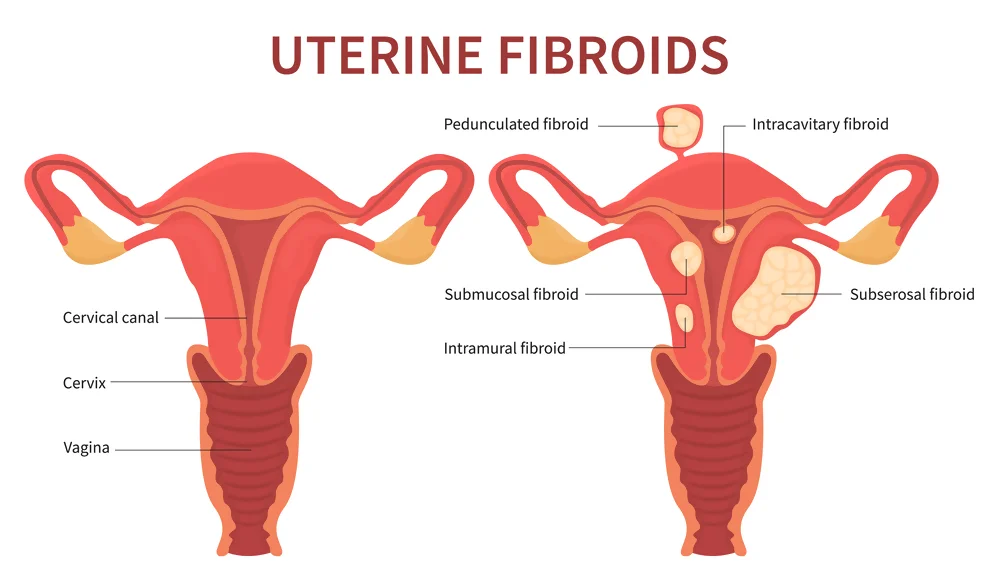
Common Symptoms of Uterine Fibroids
Uterine fibroids can range in size and location, leading to a wide variety of symptoms. While some women may have no noticeable signs, others experience significant discomfort or disruption in daily life. At Naturopath Osteopath Clinic, we help identify and manage these symptoms through comprehensive naturopathic evaluation and care.
Key Symptoms to Watch For:
- Heavy or prolonged menstrual bleeding – Often leading to anemia and fatigue.
- Pelvic pain or pressure – A feeling of fullness or bloating in the lower abdomen.
- Lower back pain – Caused by pressure from fibroids pressing against nerves or surrounding structures.
- Frequent urination – Due to fibroids pressing on the bladder.
- Constipation – When fibroids press on the rectum.
- Pain during intercourse – Especially if fibroids are located near the cervix or lower uterus.
- Enlarged abdomen – Some women may appear bloated or pregnant due to the size and placement of fibroids.
- Menstrual cramps – More intense and longer-lasting than typical cycles.
- Difficulty with fertility or pregnancy complications – In some cases, fibroids can interfere with conception or gestation.
If you're experiencing any of these symptoms, we encourage you to consult with our experienced naturopathic doctors. Our goal is to uncover the root cause of your discomfort and create a personalized care plan that restores balance and wellness naturally.

Menopause and Uterine Fibroids
Menopause is a natural transition in a woman’s life marked by hormonal changes, particularly a decline in estrogen and progesterone levels. These hormonal shifts can influence the behavior of uterine fibroids—non-cancerous growths in the uterus that often develop during reproductive years.
At Naturopath Osteopath Clinic, we take a holistic and individualized approach to managing both menopause and fibroid-related symptoms. Our naturopathic doctors assess your full health picture, including hormone levels, lifestyle factors, and overall well-being.
Understanding the Connection
- Before menopause: Fibroids may grow due to higher estrogen levels, causing heavy bleeding, cramping, pelvic pain, and urinary pressure.
- During perimenopause: Fluctuating hormones may cause fibroid-related symptoms to intensify temporarily.
- After menopause: Fibroids often shrink due to the drop in estrogen, but symptoms may persist if fibroids are large or if other health issues are present.
Our Natural Treatment Focus Includes:
- Botanical medicine to support hormonal balance and fibroid shrinkage.
- Customized nutritional plans to reduce estrogen dominance and inflammation.
- Supplemental support for liver detoxification and hormone metabolism.
- Stress management techniques to balance adrenal and reproductive hormones.
- Monitoring with lab testing such as our Female Hormone Panel.
Whether you are transitioning into menopause or already postmenopausal, our integrative care model ensures your unique health needs are supported. Let us help you navigate menopause with greater ease and address uterine fibroids naturally and effectively.
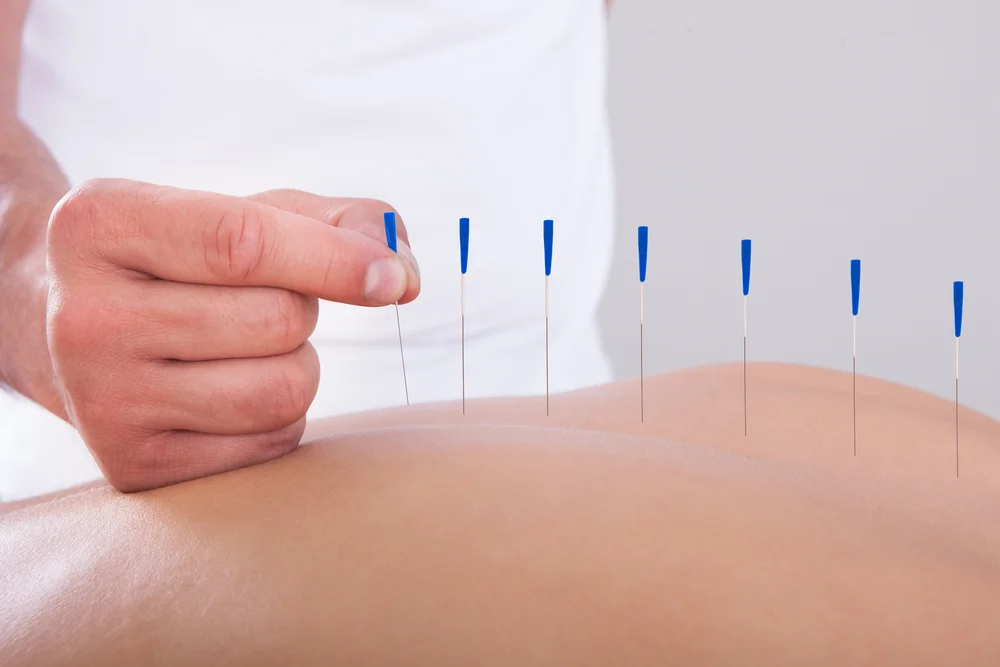
Acupuncture Treatment for Uterine Fibroid
At Naturopath Osteopath Clinic, we offer acupuncture therapy as a gentle, natural approach to managing uterine fibroids. Acupuncture, rooted in Traditional Chinese Medicine (TCM), aims to restore energetic balance in the body and enhance overall well-being. When used for fibroids, acupuncture can help reduce symptoms and support hormonal regulation.
How Acupuncture Supports Fibroid Management
- Improves blood circulation to the uterus, helping reduce fibroid growth and pain.
- Regulates estrogen levels, addressing hormonal imbalances that contribute to fibroid development.
- Reduces pelvic inflammation and cramping associated with fibroids.
- Alleviates menstrual irregularities, including heavy or prolonged periods.
- Enhances emotional well-being by reducing stress and supporting the nervous system.
What to Expect During Acupuncture Treatment
Treatment sessions typically involve inserting very fine, sterile needles into specific points on the body that correspond to reproductive and endocrine system function. Each session lasts about 30–60 minutes and is tailored to your unique symptoms and overall health.
Integrative Healing at Our Clinic
We often combine acupuncture with other naturopathic therapies such as nutritional counseling, hormone testing, and herbal medicine to support fibroid reduction and overall hormonal balance.
If you're looking for a non-invasive, drug-free approach to managing uterine fibroids, acupuncture may be an ideal option. Contact us today to schedule a consultation and discover how holistic therapies can support your reproductive health naturally.
Naturopath Osteopath Clinic Services

Women’s Health and Wellness
Naturopathic doctors often specialize in women’s health and wellness, providing personalized, integrative care that supports women through every stage of life. From adolescence and fertility to pregnancy, menopause, and healthy aging, naturopathic care focuses on prevention, hormonal balance, and whole-body wellness—empowering women to take an active role in their long-term health.

Men’s Health and Wellness
Men’s health and wellness are essential not only for individual vitality but also for the strength of families and the resilience of entire communities. Prioritizing men’s physical, mental, and emotional well-being leads to healthier relationships, improved quality of life, and increased productivity—ultimately contributing to a more balanced and thriving society. Comprehensive care for men supports long-term health, disease prevention, and overall fulfillment at every stage of life.

Mental Health
A holistic approach can be especially beneficial for individuals facing mental health challenges, as it aims to identify and address the underlying causes of symptoms—not just manage them. By considering the physical, emotional, and lifestyle factors that contribute to well-being, holistic care supports more comprehensive and lasting mental health outcomes.
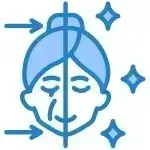
Integumentary System, Skin Conditions
Naturopathic doctors often specialize in the integumentary system, which includes the skin, hair, and nails. Through a holistic and individualized approach, they can effectively address a range of skin conditions such as acne, eczema, psoriasis, and other inflammatory or chronic dermatological concerns. By identifying the root causes—whether hormonal, digestive, or immune-related—naturopathic care supports long-term skin health from the inside out.
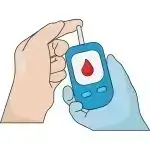
Endocrine Conditions
Naturopathic doctors commonly support patients with endocrine-related conditions such as diabetes, thyroid dysfunction, and adrenal fatigue. By addressing hormonal imbalances through lifestyle changes, nutritional support, and targeted natural therapies, naturopathic care aims to restore optimal endocrine function and improve overall well-being.

Cardiovascular Conditions
Naturopathic doctors provide holistic, patient-centered care and can support individuals with a wide range of cardiovascular conditions. By focusing on lifestyle, nutrition, stress management, and natural therapies, they work to address underlying risk factors and promote long-term heart health.

Autoimmune disorders, Immune System Condition
An immune system condition refers to any disorder that affects the body’s ability to defend itself against illness and disease. This includes a wide range of issues such as chronic infections, autoimmune diseases, and allergic reactions—each involving an imbalance or dysfunction in immune system response.

Rheumatologic and Musculoskeletal Conditions
Rheumatologic and musculoskeletal conditions refer to disorders that affect the joints, muscles, bones, and connective tissues, often resulting in pain, inflammation, stiffness, and restricted mobility. These conditions can significantly impact daily function and quality of life if not properly managed.
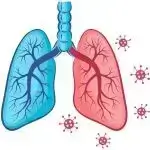
Respiratory System Conditions
A Naturopathic Doctor (ND) takes a holistic approach to care, focusing on treating the whole person rather than just the symptoms of an illness. Rooted in the belief that the body has an innate ability to heal itself, naturopathic medicine emphasizes identifying and addressing the underlying causes of disease while supporting the body’s natural healing processes.
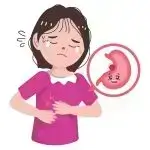
Gastrointestinal Conditions
A naturopathic doctor specializing in gastrointestinal conditions typically utilizes a range of natural therapies to support and restore digestive health. This may include nutritional counseling, herbal medicine, probiotics, lifestyle modifications, and stress management techniques—each tailored to address the root causes of digestive imbalance and promote optimal gut function.
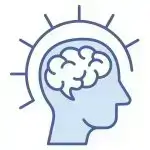
Neurology and Pain Management
Naturopathic doctors are trained in a wide range of natural therapies that can support the treatment of neurological conditions. These therapies may include botanical medicine, homeopathy, acupuncture, nutritional support, and lifestyle interventions—each aimed at improving nervous system function, reducing inflammation, and enhancing overall neurological well-being.
If you liked this content and found it to be informative, please rate it.
We are sorry that this post was not useful for you!
Let us improve this post!
Tell us how we can improve this post?
